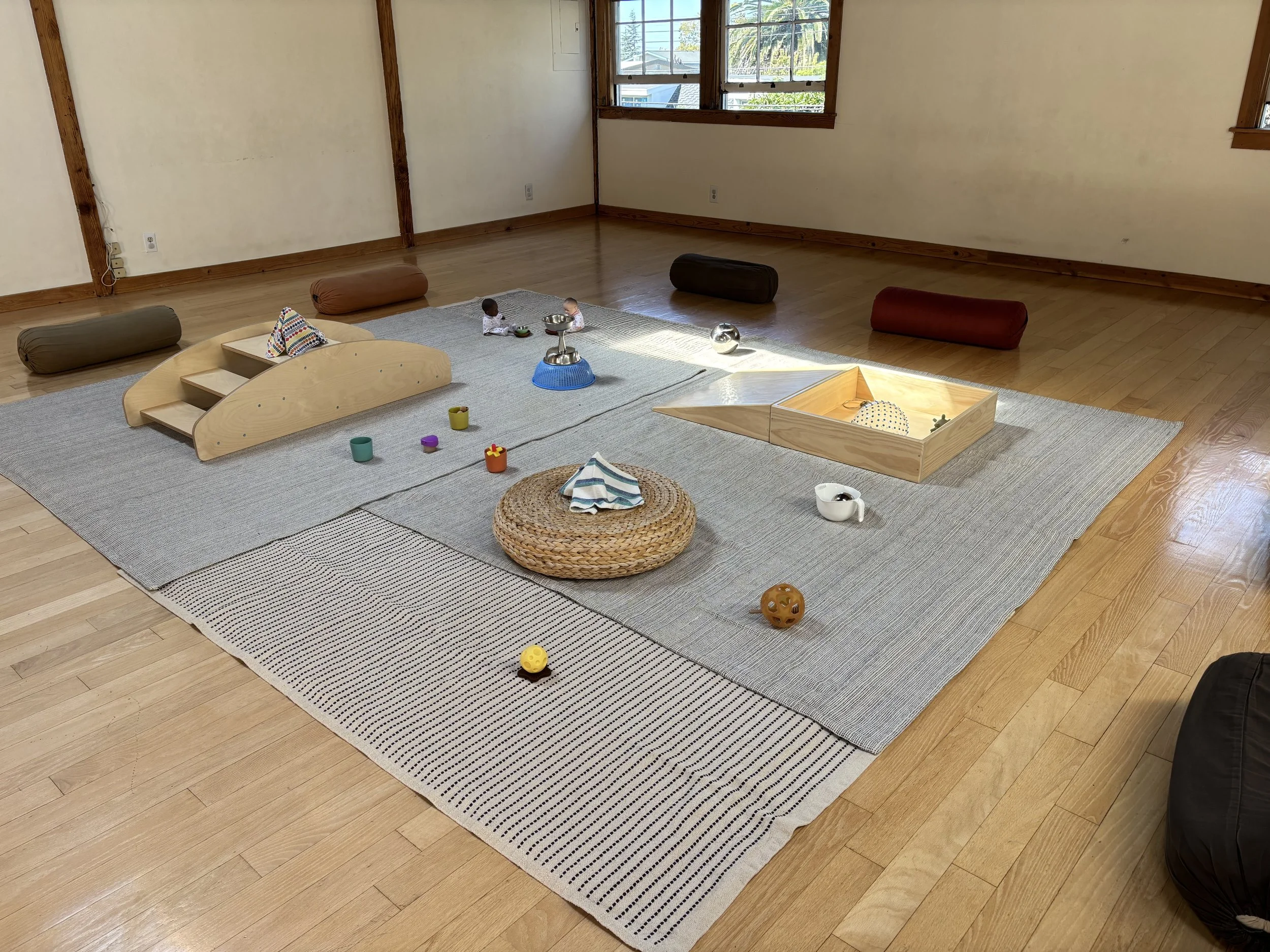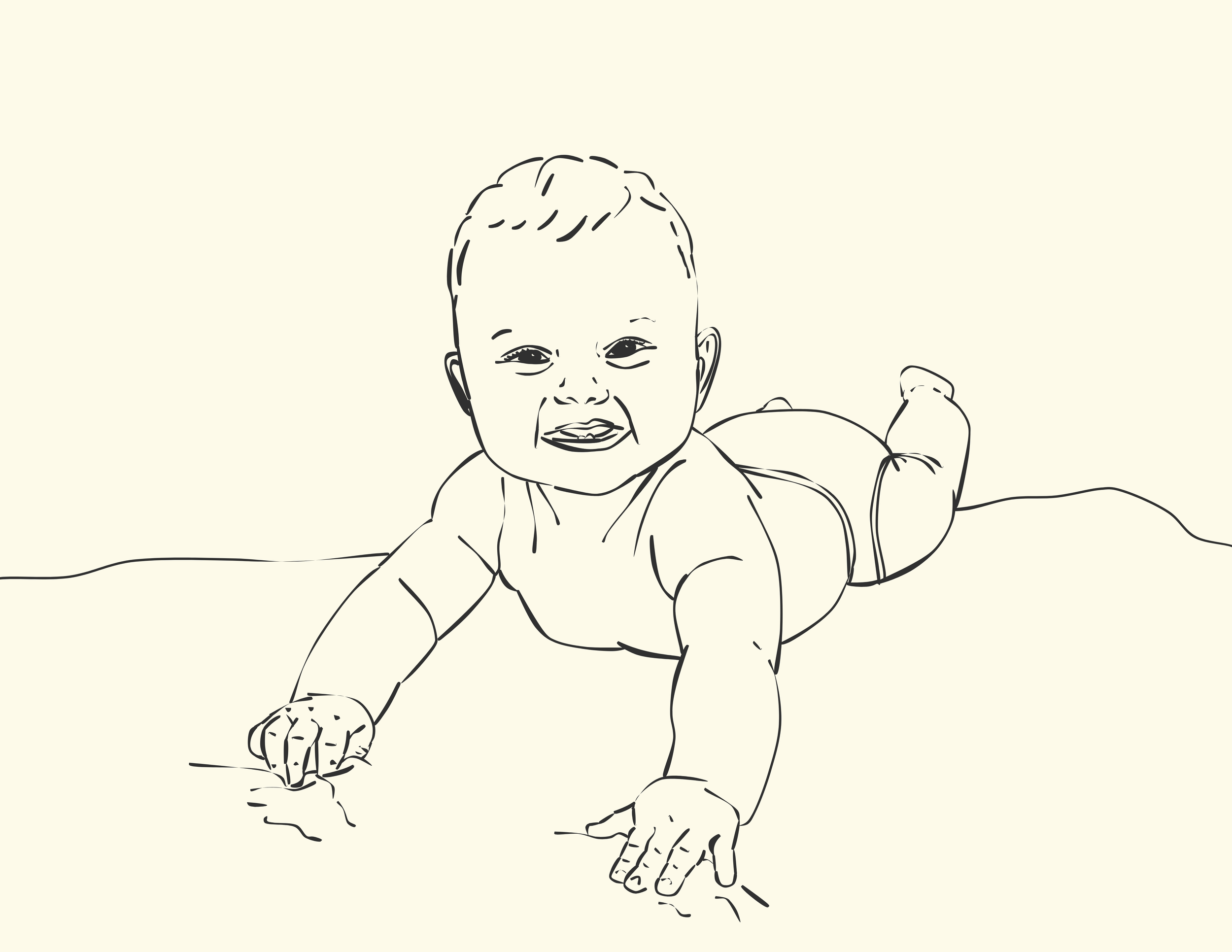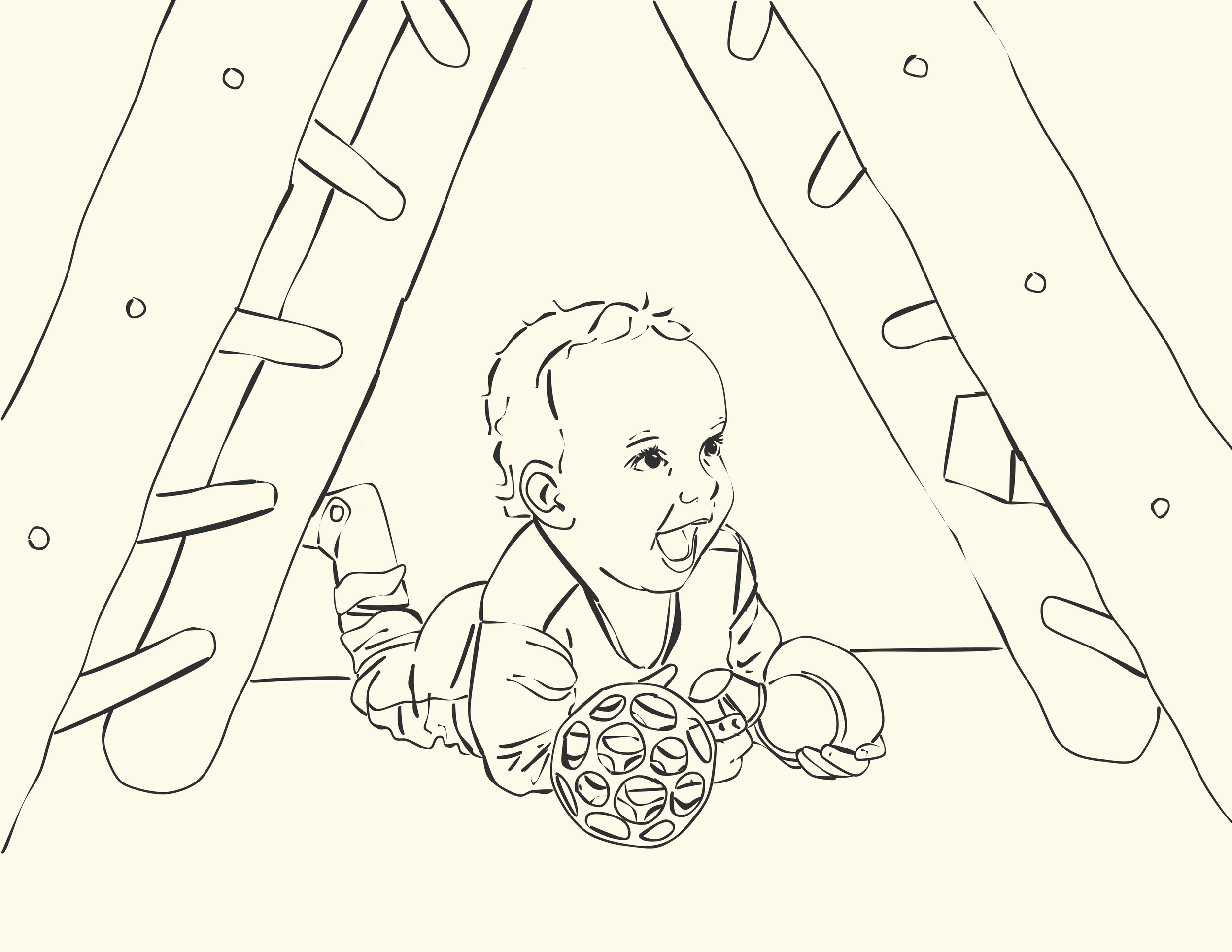Parent-Child Playgroups
These observation-based parent-child playgroups invite you to take a step back and witness the natural unfolding of your infant's gross motor development and early social relationships. We’ll also explore the value of collaborative, respectful, and dignified care when engaging your infant in tasks like diapering and toileting, feeding, and dressing.
Curious to know more? Check out the playgroup details below, browse the reviews, and fill out the inquiry form for registration information or to inquire about upcoming programming. ☻
New Spring playgroup dates below!
Currently enrolled playgroup families looking to return for another series: No need to fill out the playgroup inquiry form. Just email me and I’ll send you the new sign-up link. ☻
NEW PLAYGROUP SESSIONS
THURSDAY Pre-Mobile Babies
NEW SPRING SERIES - 4 spots remaining!
LOCATION: Berkeley Yoga Center @ 2121 Bonar St
This group is for babies who are back-lying, wriggling, pivoting, and working their way toward rolling, rocking, and slithering, typically between the ages of 2 and 8 months. Parents of competent crawlers should inquire about a Mobile Babies group. Babies should be at least 2 months old by first class start date.
Price: $365 for an 8-week series
DATES + TIME:
THURSDAYS - 3:00 pm to 4:30 pm
3/12 ❋ 3/19 ❋ 3/26 ❋ 4/2 ❋ 4/9 ❋ 4/16 ❋ 4/23 ❋ 4/30 (2026)
SUNDAY Mobile Babies
NEW SPRING SERIES - 4 spots remaining!
LOCATION: Berkeley Yoga Center @ 2121 Bonar St, Berkeley
This group is for babies who are slithering on their bellies, crawling on hands and knees, pulling to stand, cruising, and freshly walking, often between the ages of 7 and 14 months.
Price: $365 for an 8-week series
DATES + TIME:
SUNDAYS - 11:00 am to 12:30 pm
3/8 ❋ 3/15 ❋ 3/22 ❋ 3/29 ❋ 4/12 ❋ 4/19 ❋ 4/26 ❋ 5/3
NO CLASS 4/5 (Easter Sunday)
FRIDAY Mobile Babies
NEW SPRING SERIES - 4 spots remaining!
LOCATION: Danspace @ 473 Hudson St, Oakland
This group is for babies who are slithering on their bellies, crawling on hands and knees, pulling to stand, cruising, and freshly walking, often between the ages of 7 and 14 months.
Price: $365 for an 8-week series
DATES + TIME:
FRIDAYS - 11:30 am to 1:00 pm
3/13 ❋ 3/20 ❋ 3/27 ❋ 4/3 ❋ 4/10 ❋ 4/17 ❋ 4/24 ❋ 5/1
Interested in joining a playgroup?
Fill out this inquiry form and I’ll get back to you shortly regarding availability and registration information.
Be sure to check your spam folder if you think you haven’t heard back!

Playgroup FAQ
-
These playgroups provide caregivers an opportunity to refine their observation skills as they witness their child’s motor and social development, explore the role of attunement and tenderness during caregiving tasks, and avoid parental burn-out by embracing a less-is-more mindset. To better help you learn and enjoy your time in the group, I (Shannon) will model how I approach the babies’ interactions and movement challenges in a way that exemplifies trust in your child’s competence while intervening when necessary. Keeping an open mind to new ways of seeing and interacting with babies will help you get the most out of your time in the playgroup. ☻
Each class will start with an optional check-in, followed by a discussion topic, then quiet observation of the children’s activities with minimal interruption. The environment will have age-appropriate, open-ended materials for the babies to interact with throughout the class as well as structures that encourage varied gross motor exploration.
Babies are always welcome to nurse + bottle feed as needed throughout the class. Otherwise, please leave outside food and drinks for before or after class time.
We’ll wrap up class by discussing any questions that arise, what we’ve observed, and relevant topics, like baby sleep, movement, play, emotions, etc. We’ll engage in a bit of group tidying of the materials, then finish off with a group goodbye song.
CLICK HERE to see a video from the official RIE® Youtube channel that explains the general class flow and shows the types of materials the babies engage with in class.
-
Pikler + RIE®:
The RIE® Educaring approach was developed by a woman named Magda Gerber. Magda’s work with infants is based on the research and observations of Dr. Emmi Pikler, a Hungarian pediatrician. Dr. Pikler observed that when babies were allowed to develop their gross motor movements at their own pace, their posture, quality of movement, risk assessment, and trust in their bodies improved. One important way this translates to what we do in class is that we leave babies to discover their bodies and movement abilities on their own. For young infants, this means placing them on their backs to learn and play, as back-lying provides them a large visual field, the ability to comfortably pivot their head around, as well as opportunities to coordinate their arm and leg movements to meet or cross their midline. For older infants, this means we avoid propping them up to sitting/standing or helping them walk before they can achieve these skills on their own.
Another important feature of the work of Pikler and Gerber is the importance of collaborative, slow-paced, and present caregiving when engaging in activities like diapering + toileting, feeding, bathing, and dressing your child.
Montessori:
The Montessori approach to infancy also values freedom of movement as well as responsive, attuned caregiving. A key principle of Montessori is the prepared environment, which includes the emotional preparation of the adult as well as the preparation of the physical space. As children move into toddlerhood, Montessori emphasizes preparing these environments to maximize the child’s ability to contribute to family life, which bolsters their self-esteem and supports their growing desire for autonomy.
Because I’ve learned from a range of child development and respectful caregiving models, I’ll often bring these into discussions when relevant.
All of this information will be further explored throughout the 8-week session. ☻
-
When considering group placement, it’s key to account for your child’s stage of mobility rather than their age. While there are general age ranges listed above to provide some guidance, I honor each child’s unique motor development timeline and you should not feel bound to one group by the listed age range. If you are unsure about which group would best suit your child, let’s connect and talk about it!
There is a wide range of “typical” development, and your child’s placement in either group is not a measure of how “advanced” or “behind” they are. Every child’s developmental timeline is worth trusting. ☻
-
BERKELEY:
The Thursday Pre-Mobile Babies and Sunday Mobile Babies playgroups take place at the Berkeley Yoga Center, which is in the building between Bonar Street and Strawberry Creek Park’s grassy field area. The yoga studio is not wheelchair accessible. The studio is up a flight of stairs, so strollers should be left at home/in cars and your child can be carried up in your arms or in a carrier. If this is a concern for you, please reach out!
There is a bathroom in the studio. For the babies, there is a dedicated changing area with a changing pad and liners. I also provide a small potty in the bathroom if your family practices elimination communication.
Free parking is available on various neighboring streets. Expect to park a few blocks away on weekends, as the neighboring park can get busy.
OAKLAND:
The Friday Mobile Babies playgroup takes place at Danspace, near Frog Park in the Rockridge area of Oakland. The studio is on the first floor of the building, but does not have stroller parking, so strollers should be left at home/in cars.
There is a bathroom on site. For the babies, there is a dedicated changing area with a changing pad and liners. I also provide a small potty and toilet seat reducer in the bathroom if your family practices elimination communication.
Free parking is available on various neighboring streets.
-
Each baby’s primary caregiver(s) are always welcome to join each group.
Once we are a few weeks into the session, additional observers are also welcome to come. If you have a nanny, grandparent, family member or friend who you’d like to invite, please reach out to let me know a few days beforehand, and give them a quick briefing on what to expect from the group.
Please limit attendance to 1 to 2 primary caregivers + 1 to 2 adult guests for any given class.
I may also occasionally have guests come observe and will let you know ahead of time who is there. Guests of mine who may visit may be mentors of mine, students, family members, or friends interested in learning more about these playgroups.
-
Babies should be dressed in well-fitting, but not restrictive clothing so that they can access their full range of movement. Avoid non-stretch fabrics like denim as well as styles like skirts and dresses that can easily get caught under baby's hands, feet, and knees. Remove socks, shoes, booties, pacifiers, and mittens so they have free access to their hands and feet and mouth, which are key to taking in their environment.
Adults can dress as they like keeping in mind that they will be seated on the floor and will be asked to remove shoes before entering. The studio temperature can fluctuate depending on outside temps, so dressing in layers that can be easily added or taken off can be helpful.
Please refrain from wearing any strong fragrances.
-
This playgroup is a time to be deeply present. Phones should be on Silent, Do Not Disturb, or Airplane mode. You are welcome to take a few quick photos of your own child. If you’d like to take a picture with other children in it, please consult the caregivers of that child.
Generally, phones should stay stowed away for the duration of class so you can fully engage in sensitive observation.
-
Frequency of attendance is of course up to you, but I hope you’ll come for each date listed in the series! Sessions have 8 meet-ups so that children and families get to know each other, which helps everyone settle into more easeful play.
Late arrivals: it can be tricky to get out the door with young children. Arrive as soon as you can and enter the space calmly. To get the most out of your time in the group, arrive within 15 minutes of the listed start time. About 45 minutes after the hour, we start our quiet observation period, so it’s best to arrive before then to cause the least amount of disruption.
If you know ahead of time you’re going to be absent, please send me a quick message via email or text. I often have each child in mind when setting up the space, and your child’s presence or absence often determines what materials I choose for the group.
-
Free trials are not available, but you can arrange to come observe a playgroup. ☻
Observations are adult-only, meaning if you have a baby, your baby cannot attend with you.
A great time to arrange an observation would be when you’re expecting or when you feel comfortable enough to spend a little over an hour away from your baby so you have enough time to observe a playgroup session, which is 1.5 hours long.
Observations are available not only to parents or soon-to-be parents, but also to anyone curious to learn more about what respectful caregiving looks like in practice, including nannies, sitters, students, etc. Use the Contact Form to reach out and schedule an observation.
-
While I always aim to be considerate of each family’s circumstances and understand that life comes with unexpected twists and turns, I am also a very small, one-person business and I spend a lot of time making sure these playgroups are warm, informative, and inviting for the families attending.
Refunds + Withdrawals:
While I don’t automatically offer refunds for withdrawals, I do want to hear you out if something comes up or isn’t working for you. I will consider individual refunds on a case-by-case basis, but please understand that if you commit to attending a playgroup and then withdraw, it can be difficult to find someone to fill your spot.
If you find that you have to withdraw before the playgroup begins, please give me at least 7 days notice if you’d like a full refund. If you decide to withdraw last-minute (within 6 days or fewer of the playgroup start date), you will receive a partial refund of 30% of what you paid for the playgroup.
Missed Classes:
I do not offer make-ups if your family has to miss a playgroup day. Make-up dates are only scheduled if class is canceled due to unforeseen circumstances. You will be notified of cancellations via email as soon as they come up.
-
In a space where materials will be shared among infants who often explore things with their mouths, it’s important to keep your child home when they’re unwell. Please stay home if either you or your child is experiencing any of the following symptoms:
Temperature at or exceeding 100 °F (37.5 °C)
Diarrhea or vomiting in the last 48 hours
Discharge from eyes
Excessive, runny mucus from nose
Productive, persistent, rumbling cough
Unidentified rash, bumps, or sores
Unusual lethargy
We trust that you will use your sound judgment when deciding if your child is in good enough shape to attend the play group. We are counting on caregivers to make sure the community stays healthy and well.
If you are unclear about whether or not your child should attend, a good question to ask yourself is, “How would I feel if another child showed up like this to class?”
Thank you in advance for taking the appropriate precautions in keeping the community well!
Playgroup Reviews



